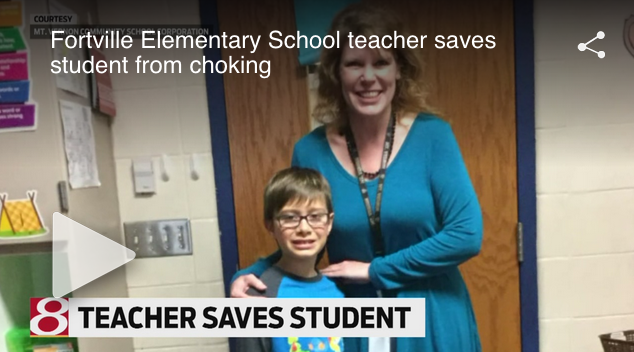Miracle on ice: Hockey player saves team member who went into cardiac arrest during game
It was truly a “miracle on ice” when a North Carolina doctor saved a fellow hockey player’s life during a pickup game.
Jib Street, a native of Canada who has been playing hockey his whole life, dropped in the Pineville rink in January after he went into cardiac arrest. But, as luck would have it, a fellow player was a medical doctor.
“When I did see the video a couple of days ago, it is difficult to watch yourself go down and lie motionless on the ice. The gratitude comes from how fast this guy responded– that’s the miracle,” Street told FOX 46. “I’m skating with an emergency room doctor.”

Dr. Craig Bryant, an emergency room doctor, helped save Jib Street’s life after he collapsed on the ice during a January pickup game. (FOX 46)
Dr. Craig Bryant, whom Street calls his “guardian angel,” and other teammates quickly jumped into action to save his life.
Bryant immediately began CPR and used an AED unit. Street didn’t have a pulse for five minutes.
“It took a village, there were so many guys that were involved,” Bryant told him.
Street made a full recovery and gave Bryan one of his most prized possessions, a signed hockey jersey, as a token of his gratitude.
“Oh my gosh, look at this. That is amazing. Signed by Wayne Gretzky,” Bryant said. “I love you, man. Thank you so much.”
Street said it’s a “blessing” that the cardiac arrest happened on the ice, with a doctor and a defibrillator nearby, otherwise the result might not have been the same.
Bystanders Save Ohio Football Player with CPR
TWINSBURG, Ohio- By every measure, Colin Bowser was a healthy, active 14-year-old who loved playing football.
“He loves football. He’s very athletic , caring. We jokingly call him the gentle giant. When he started playing football he was always the big kid and didn’t want to hurt the little kids so this year, he’s starting to really flourish on the line and coaches are working with him and he’s doing great,” said his mother, Necolia Huisman.
On September 16, however, Bowser says he was running drills with his teammates when he didn’t feel right.
“I started running and then I was running for a little bit and I didn’t feel good so I sat down,” said Bowser, explaining that he is not usually the one who sits down at practice if he doesn’t feel well.
Bowser says his coach escorted him into the locker room to get some water where the last thing he remembers is passing out.
A trainer who had just arrived, immediately realized the seriousness of the situation and started CPR while coaches called 911.
“She started CPR immediately and by the second time through the CPR I took a deep breath and then the fire paramedics came in,” said Bowser.
Derrick Kulcsar and Jeff Hall were the first paramedics to arrive.
“We observed our patient lying on the floor and we hooked him up to our heart monitor and it showed a rhythm that needed attention,” said Hall.
The condition, called ventricular fibrillation, is extremely dangerous and life-threatening without immediate intervention.
“Basically the heart is just fibrillating; there’s no actual beat and there’s no blood flow so the heart is just quivering,” he added.
“I think everything came into play with Colin — from recognizing that he was in cardiac arrest to the trainer initiating CPR immediately to the coaches calling 911, and our response time going to the scene– just everything lined up for Colin,” said Kulcsar.
Kevin Rott also responded to assist as part of a crew on a fire truck.
“Your initial thought is, you know, this is serious; this is bad. You go through many different stages of mental state; soon as you get on scene, your mental training kicks in,” said Rott.
Medics were able to shock Bowser’s heart back into a normal rhythm.
He was taken to a Cleveland hospital where he was given an internal defibrilator.
Later, he returned to Twinsburg Fire Station #1 to thank the medics who helped save his life.
“I can’t really describe how thankful I am because if it wasn’t for them I wouldn’t be standing here with this interview right now,” said Bowser.
“You need a mental boost like this that we do make a difference,” said firefighter and paramedic, Brian Laughlin, who responded to the scene from Twinsburg Fire Station #2.
Laughlin credits the quick-thinking of the high school coaches and trainers for starting the process that saved Bowser’s life.
“Any saves that I have seen in the majority of my career is the people that are saved are people that have CPR initiated prior to our arrival; that CPR you can’t say enough about it,” said Laughlin.
“Had (the head coach) not walked with him, had Megan (the trainer) not been there to start CPR, had the medics not got there as quick as they were he would not be standing here today,” said Huisman.
Bowser says he expects to be on the sidelines when Twinsburg’s varsity team plays on Thursday evening and after passing a stress test hopes to be able to return to the field himself.
Fortville Teacher Saves Student’s Life
FORTVILLE, Ind. (WISH) — The quick thinking of an elementary school teacher helped to save a student’s life. read more…
AED Saves Man’s Life, turns into Holiday Gift
INDIANAPOLIS – A man’s life was saved in April after he collapsed on the basketball court at a gym on Indy’s north side. He is now making efforts to save the lives of others. read more…


